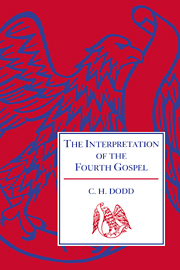Book contents
- Frontmatter
- Contents
- PART I THE BACKGROUND
- PART II LEADING IDEAS
- 1 Symbolism
- 2 Eternal life
- 3 Knowledge of God
- 4 Truth
- 5 Faith
- 6 Union with God
- 7 Light, Glory, Judgment
- 8 Spirit
- 9 Messiah
- 10 Son of Man
- 11 Son of God
- 12 Logos
- PART III ARGUMENT AND STRUCTURE
- APPENDIX: Some considerations upon the historical aspect of the Fourth Gospel
- Index Locorum
- Index Nominum
1 - Symbolism
from PART II - LEADING IDEAS
Published online by Cambridge University Press: 10 December 2009
- Frontmatter
- Contents
- PART I THE BACKGROUND
- PART II LEADING IDEAS
- 1 Symbolism
- 2 Eternal life
- 3 Knowledge of God
- 4 Truth
- 5 Faith
- 6 Union with God
- 7 Light, Glory, Judgment
- 8 Spirit
- 9 Messiah
- 10 Son of Man
- 11 Son of God
- 12 Logos
- PART III ARGUMENT AND STRUCTURE
- APPENDIX: Some considerations upon the historical aspect of the Fourth Gospel
- Index Locorum
- Index Nominum
Summary
In Part I, we have surveyed the background of Johannine thought. The survey was of course far from exhaustive, but the results may be summarized as follows. While the evangelist stands within the general environment of primitive Christianity, and may have been in some measure influenced by Paul, he also shows affinities with certain tendencies in non-Christian thought. He is well aware of the teaching of Rabbinic Judaism, but only partly sympathetic to it. He is more sympathetically in touch with Hellenistic Judaism as represented by Philo. Like Philo himself, he is in contact with the higher pagan thought of the time, as represented to us by the Hermetic literature. ‘Gnosticism’ has in part the same roots as Johannine Christianity, and serves in some measure to illustrate Johannine conceptions, but more by contrast than by affinity. Mandaism turns out to be too late in date to be of any direct importance for our investigation, though in so far as it retains elements of earlier Gnosticism it may afford some illustrative parallels. Rabbinic Judaism, Philo and the Hermetica remain our most direct sources for the background of thought, and in each case the distinctive character of Johannine Christianity is brought out by observing the transformation it wrought in ideas which it holds in common with other forms of religion.
Part II will deal with the leading religious concepts employed in the Fourth Gospel, and will aim at defining their meaning in the context already indicated, which is assumed to be that of the readers to whom the work was originally addressed.
- Type
- Chapter
- Information
- The Interpretation of the Fourth Gospel , pp. 133 - 143Publisher: Cambridge University PressPrint publication year: 1953



